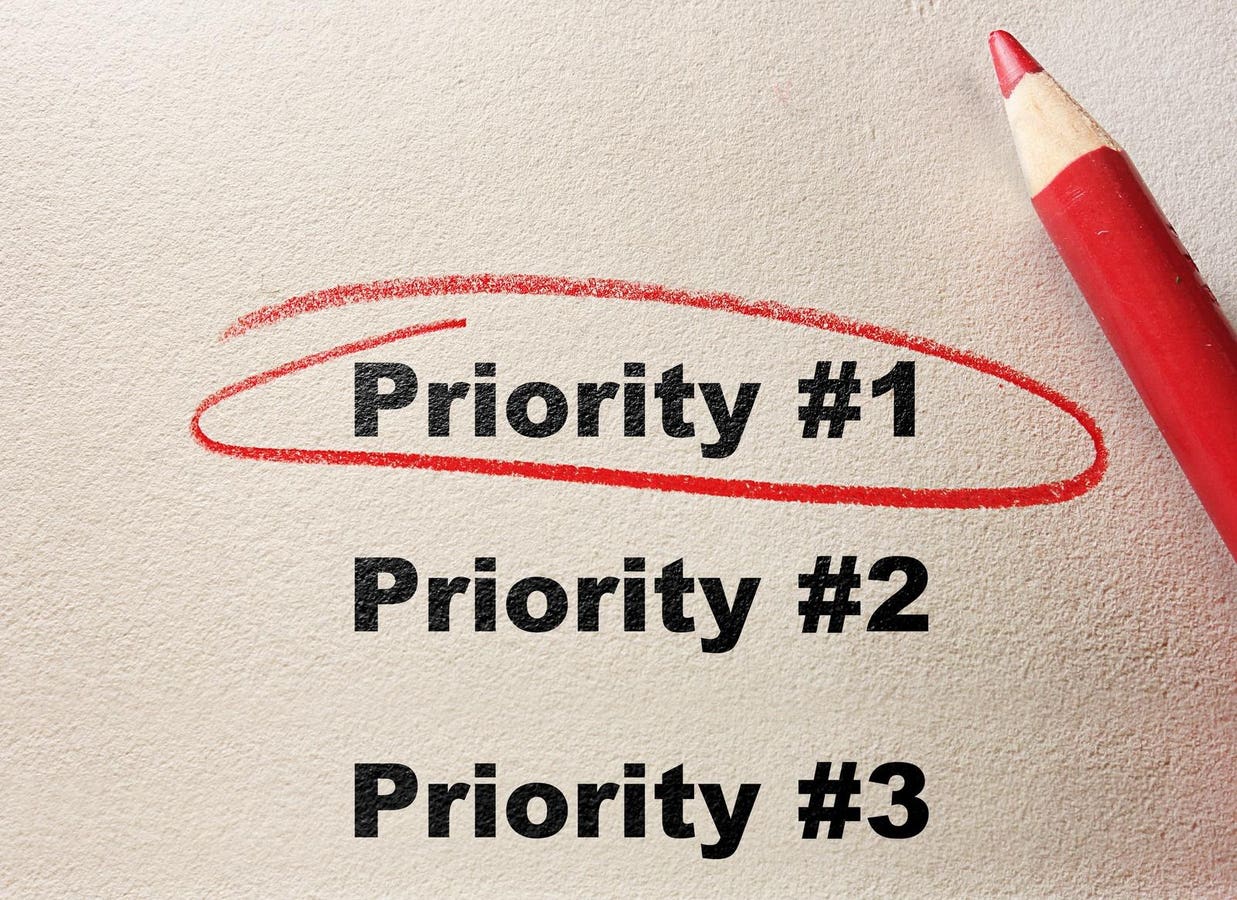I’m a professional prioritizer. As a financial advisor, it’s not my preferences that I am responsible for articulating nor my priorities that I am duty-bound to help order, but my clients’. And after 26 years in this business, I have no doubt that financial planning is more about prioritization than possession. This is because no matter how much money anyone has, no one possesses all the resources—time, influence, money, energy, and relationships—that are necessary to do everything they want to do in the world instantly.
Therefore, one of the greatest challenges we have is managing our vast number of priorities and their effective ordering. But a glance at the etymology of the word “priority” is instructive. If my research proves correct, the word entered the English language in the 1300s, so it’s been around for a while. For hundreds of years, it was a starkly singular word meaning the first or most important thing.
It’s right there in the word itself, derived from the Latin “prioritas,” meaning “earliness, precedence, or being first in rank or time.” It wasn’t until a worldwide drive for efficiency was introduced through the Industrial Revolution that the word priority was pluralized. Now, we all have a plethora of priorities. Yet, in pluralizing our priorities, we can’t help but deprioritize that which truly comes first—our priority.
Even then, we must still act on our convictions, as Shane Parrish reminds us with his question that cuts right to the core: “If someone looked at how you spent your time over the last year, would what they see as your priorities match what you see as your priorities?”
I’ll rephrase the question: If someone looked at how you spend your time, influence, money, energy, and in which relationships you invest the most, would they know what the most important thing in your life is? Would it be clear what your singular priority is? When we are clear on this, our bigger decisions don’t necessarily become any easier, but they do become much simpler.
Yet despite a clear understanding of this concept, a deep conviction in its veracity, and seeing its benefits in my work and personal life, I recently fell prey to the siren’s song of plural priorities and needed help being tied to the proverbial mast.
My personal, singular priority is clear (to me) and not horribly uncommon. It’s my family—my wife, two young adult sons, and their newly arrived baby sister. (Surprise!) When our daughter was born in early November of 2023, everything went as planned. Until a week later. At that time, my wife’s intense abdominal pain led us back to the emergency room and resulted in a subsequent emergency surgery.
Thankfully, everything went smoothly, until we returned home from our second hospital stay in 10 days. Then it hit me that we not only had a newborn but that the primary designated caretaker for said baby was also in need of caretaking herself, as my wife, who had eagerly adopted the role of stay-at-home mom was still in recovery. For eight weeks.
In my mind, I’d had it all figured out. I’d pledged to my team members at work that I’d miss a little time when the baby was born but that I’d be available enough to still deliver on the “big rocks” to which I’d committed for the quarter. In retrospect, I’m embarrassed to realize that it was my pride speaking, not my priority.
For a few days, I found myself in a very conflicted place, almost paralyzed by the friction between my ultimate and penultimate priorities. Even after reaching the breaking-point realization that the tension was untenable, confessing as much to my CEO, and receiving her recommendation to ignore work for several weeks to care for my family, I came back to her with a “plan” that included several meetings, a bunch of research, and several other commitments during my “time off.” I was still holding onto the false hope of the work/life balance myth when I really needed to put everything I had into life at that moment.
Then she floored me with this directive:
“Let go of the fear and the guilt and the shame. Receive the blessing with gratitude. We’ve got this. We’ve got you. You must have them.”
I, a professional prioritizer, who has long espoused the power of acknowledging a singular priority for the sake of clear decision making, needed to be reminded (or demanded?) to keep my first thing first.
And this is one of the reasons I’m so convinced of the value and promise of true wealth management—and why I, as an advisory veteran, have my own advisor. Because personal finance is more personal than it is finance, and the mere knowledge of the forest is no guarantee that we will not run headfirst into a tree without a capable guide.
So, how does this word study and anecdote apply to you?
Are you swimming in a sea of plural priorities as the New Year dawns? Have you ever contemplated or articulated your singular priority—the most important thing that you won’t compromise? Are you hedging, like I was? Do you suffer from any sense of fear, guilt, or shame that you would act on your deepest held convictions?
Or, as Greg McKeown asked in a recent tweet, followed by a brilliant drawing (below) that I hope you’ll consider printing and placing in a prominent place:
“What is the ONE priority for you in 2024, in one word?”
Read the full article here










